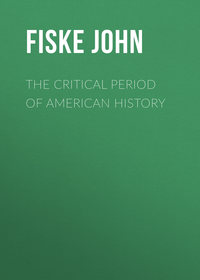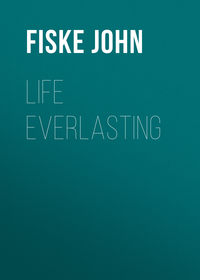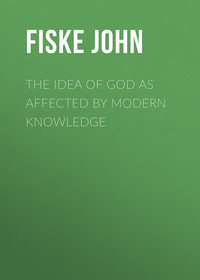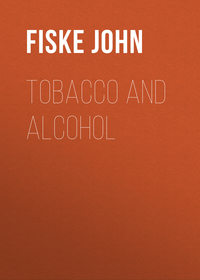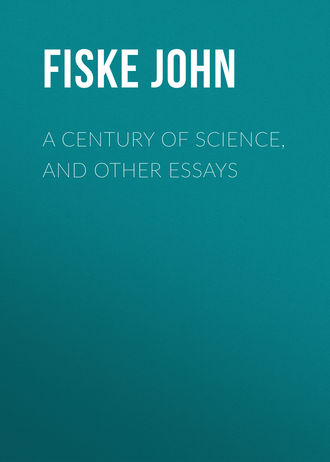 полная версия
полная версияA Century of Science, and Other Essays
By this time there had been so many deaths that induction by simple enumeration was getting to be too much for the Adoni-shomo. They were beginning to realize the old Scotchman's conception of the elect: "Eh, Jamie! hoo mony d'ye thank there be of the elact noo alive on earth?" "Eh! mabbee a doozen." "Hoot, mon, nae sae mony as thot!" We found our worthy hosts less willing than of old to discuss their doctrine of terrestrial immortality, and there were symptoms of a tendency to give it a Pickwickian construction. Since that day, their little community has vanished, and its glorious landscape knows it no more.
It is a pity that before the end it should not have had a visit from Mr. Hyland C. Kirk, whose book on "The Possibility of Not Dying" was published in New York in 1883. In this book the philosophic plausibleness of the opinion that a time will come when we shall no longer need to shuffle off this mortal coil is argued at some length, but the question as to how this is to happen is ignored. Mr. Isaac Jennings, in his "Tree of Life" (1867), thinks it can be accomplished by total abstinence from "alcohol, tobacco, coffee, tea, animal food, spices, and caraway." This is sufficiently specific; but Mr. Kirk's treatment of the question is so hazy as to suggest the suspicion that he has nothing to offer us.
I once knew such a case of a delusion without any theory, or, if you please, the grin without the Cheshire cat. In the course of a lecturing journey, some thirty years ago, I was approached by a refined and cultivated gentleman, who imparted to me in strict confidence and with much modesty of manner the fact that he had arrived at a complete refutation of the undulatory theory of light! To ask him for some statement of his own theory was but ordinary courtesy; but whenever we arrived at this point – which happened perhaps half a dozen times – he would put on a smile of mystery and decline to pursue the subject. I assured him that he need have no fear of my stealing his thunder, for I had not the requisite knowledge; but he grew more darkly mysterious than ever, and said that the time for him to speak had not yet come.
A few months later, this gentleman, whom I will designate as Mr. Flighty, appeared in Cambridge, and came to my desk in the college library. Distress was written in his face. He had called upon Professor Silliman and other professors in Eastern colleges, and had been shabbily treated. Nobody had shown him any politeness except Professor Youmans, in whom he believed he had found a convert. "Ah!" I exclaimed, "then you told him your theory; perhaps the time has come when you can tell it to me." But no; again came the subtle smile, and he began to descant upon the persecution of Galileo, a favourite topic with cranks of all sorts. He asked me for some of the best books on the undulatory theory, and I gave him Cauchy, whereat he stood aghast, and said the book was full of mathematics which he could not read; but he would like to see Newton's Opticks, for that book did not uphold the undulatory theory. "Oh!" said I, "then are you falling back on the corpuscular theory?" "No, indeed; mine is neither the one nor the other," and again came the Sibylline smile. As I went for the book, I found Professor Lovering in the alcove, halfway up a tall ladder. "Hallo!" said I sotto voce. "There is a man in here who has upset the undulatory theory of light; do you want to see him?" "Heavens, no! Can't you inveigle him into some dark corner while I run away?" "Don't worry," I replied, – "make yourself comfortable; I'll keep him from you." So I lured Mr. Flighty into a discourse on the bigotry of scientific folk, while Old Joe, whose fears were not so easily allayed, soon stealthily emerged from his alcove and hurried from the hall.
The next time that I happened to be in New York, chatting with Youmans at the Century Club, I alluded to Mr. Flighty, who believed he had made a convert of him.
"Ay, ay," rejoined Youmans, "and he said the same of you."
"Indeed! Well, I suspected as much. Unless you drive a crank from the room with cuffs and jeers, he is sure to think you agree with him. I do not yet know what Mr. Flighty's theory is."
"Nor I," said Youmans.
"Do you believe he has any theory at all?"
"Not a bit of it. He is a madman, and his belief that he has a theory is simply the form which his delusion takes."
"Exactly so," I said; and so it proved. Severe business troubles had wrecked Mr. Flighty's mind, and it was not long before we heard that he had killed himself in a fit of acute mania.
My story must not end with such a gruesome affair. Out of the many queer people I have known, let me mention one who is associated with pleasant memories of childhood and youth. This man was no charlatan, but a learned naturalist, of solid and genuine scientific attainments, who came to be a little daft in his old age. Dr. Joseph Barratt, whose life extended over three fourths of the present century, was born in England. He was at one time a pupil of Cuvier, and cherished his memory with the idolatrous affection which that wonderful man seems always to have inspired. Dr. Barratt, as a physician practising in Middletown, Connecticut, is one of the earliest figures in my memory, – a quaint and lovable figure. His attainments in botany and comparative anatomy were extensive; he was more or less of a geologist, and well read withal in history and general literature, besides being a fair linguist. Though eminently susceptible of the tender passion, he never married; he was neither a householder nor an autocrat of the breakfast table, but dwelt hermit-like in a queer snuggery over somebody's shop. His working-room was a rare sight; so much confusion has not been seen since this fair world weltered in its primeval chaos. With its cases of mineral and botanical specimens, stuffed birds and skeletons galore; with its beetles and spiders mounted on pins, its brains of divers creatures in jars of alcohol, its weird retorts and crucibles, its microscopes and surgeon's tools, its shelves of mysterious liquids in vials, its slabs of Portland sandstone bearing footprints of Triassic dinosaurs, and near the door a grim pterodactyl keeping guard over all, it might have been the necromancing den of a Sidrophel. Maps and crayon sketches, mingled with femurs and vertebræ, sprawled over tables and sofas and cumbered the chairs, till there was scarcely a place to sit down, while everywhere in direst helter-skelter yawned and toppled the books. And such books! There I first browsed in Geoffroy St. Hilaire and Lamarck and Blainville, and passed enchanted hours with the "Règne Animal." The doctor was a courtly gentleman of the old stripe, and never did he clear a chair for me without an apology, saying that he only awaited a leisure day to put all things in strictest order. Dear soul! that day never came.
Dr. Barratt was of course intensely interested in the Portland quarries, and they furnished the theme of the monomania which overtook him at about his sixtieth year. He accepted with enthusiasm the geological proofs of the antiquity of man in Europe, and presently undertook to reinforce them by proofs of his own gathering in the Connecticut Valley. An initial difficulty confronted him. The red freestone of that region belongs to the Triassic period, the oldest of the secondary series. It was an age of giant reptiles, contemporary with the earliest specimens of mammalian life, and not a likely place in which to look for relics of the highest of mammals. But Dr. Barratt insisted that this freestone is Eocene, thus bringing it into the tertiary series; and while geologists in general were unwilling to admit the existence of man before the Pleistocene period, he boldly carried it back to the Eocene. Thus, by adding a few million years to the antiquity of mankind and subtracting a few million from that of the rocks, he was enabled at once to maintain that he had discovered in the Portland freestone the indisputable remains of an ancient human being with only three fingers, upon whom he bestowed the name of Homo tridactylus. For companions he gave this personage four species of kangaroo, and from that time forth discoveries multiplied.
Such claims, when presented before learned societies with the doctor's quaint enthusiasm, and illustrated by his marvellous crayon sketches, were greeted with shouts of laughter. Among the geologists who chiefly provoked his wrath was the celebrated student of fossil footprints, Dr. Edward Hitchcock. "Why, sir," he would exclaim, "Dr. Hitchcock is a perfect fool, sir! I can teach ten of him, sir!" In spite of all scoffs and rebuffs, the old gentleman moved on to the end serene in his unshakable convictions. A courteous listener was, of course, a rare boon to him; and so, in that little town, it became his habit to confide his new discoveries to me. When I was out walking, if chary of my half hours (as sometimes happened), a long detour would be necessary, to avoid his accustomed haunts; and once, on my return from a journey, I had hardly rung the doorbell when he appeared on the veranda with an essay entitled "An Eocene Picnic," which he hoped to publish in "The Atlantic Monthly," and which he insisted upon reading to me then and there. At one time a very large bone was found in one of the quarries, which was pronounced by Dr. Hitchcock to have belonged to an extinct batrachian; but Dr. Barratt saw in it the bone of a pachyderm. "Why, sir," said he, "it was their principal beast of burden, – as big as a rhinoceros and as gentle as a lamb. The children of Homo tridactylus used to play about his feet, sir, in perfect safety. I call him Mega-ergaton docile, 'the teachable great-worker.' Liddell and Scott give only the masculine, ergates, but for a beast of burden, sir, I prefer the neuter form. A gigantic pachyderm, sir; and Dr. Hitchcock, sir, perfect fool, sir, says it was a bullfrog!"
The mortal remains of this gentle palæontologist rest in the beautiful Indian Hill Cemetery at Middletown, and his gravestone, designed and placed there by my dear friend, the late Charles Browning, is appropriate and noble. For the doctor was after all a sterling man, whose unobtrusive merits were great, while his foibles were not important. The stone is a piece of fossil tree-trunk, brought over from Portland, imbedded in an amorphous block untouched by chisel, save where, on a bit of polished surface, one reads the name and dates, with the simple legend, "The Testimony of the Rocks."
November, 1898.
NOTE
AN ACCOUNT OF THE ADONI-SHOMO COMMUNITY
From the Springfield Republican. (1876.)
As queer a people as are often met, and apparently as upright and religious, withal, are the Community situated on the stage-road between Athol and Petersham, and commonly known thereabouts as "Howlandites" or "Fullerites." According to their account, nearly twenty-one years ago, two Worcester women, Mrs. Sarah J. Hervey and her sister, Caroline E. Hawks, had come to hope for a divine revelation to them, and in expectation of it had gone to a camp-meeting at Groton. Entering the meeting they heard a stranger "talking in tongues," who proved to be the man to meet their wants, in the person of Frederick T. Howland, a Quaker, of good social standing, from New Bedford. That day, September 15, 1855, was the origin "in the faith," though not in temporal association, of the Community, these three being the "pioneers," as Sister Hervey takes pride in calling herself and associates. Mrs. Hervey's husband died a year or two later, though not in the faith, "these things," as they say, "having been beyond him." Soon after, the new belief received the addition of eight persons from Athol, among them Leonard C. Fuller, the present Spiritual head of the Community, and his wife. In May, 1861, having been "moved by the Spirit" to form an association for living together, they settled at Fuller's, at the south end of Pleasant Street in Athol. In August, 1864, they removed to their present farm in Petersham. Brother Howland held the position of head of the body till killed by a runaway horse, not quite two years ago. His people considered him a prophet, and say the Lord spoke by him, and that he led them as Moses led the people of Israel.
Their religious belief in many respects resembles that of the Adventists, but differs in the vital point, that the reign of Christ, under the expected new dispensation, is to be spiritual, and not personal, as the Adventists hold. They construe the saying of John the Revelator, "I was in the Spirit on the Lord's day," to refer to a period of time to begin with the 7000th year of the world, which is near at hand. The judgment day they believe has already begun, and in a short time, at the opening of the new dispensation, the holy dead are to be raised. When a man who has only received "common" salvation dies, he has no consciousness till the resurrection; but some, who are "specially" saved, will not die. Miracles will be performed commonly. When the new dispensation begins they are to be of the 144,000 spoken of by John, and are to judge the nations. They do not believe in a hypothetical heaven somewhere in space; the earth is not to be destroyed but changed; and finally the devil is to be bound for a thousand years. They entirely denounce Spiritualism, saying that it is from the Devil, or Antichrist. Brother Howland, they say, lay down to rise with the prophets, and they have written out what they claim to be prophecies made by him months or years before his death as to the manner in which it should occur, which, judged by the event, are certainly striking.
The Community live mostly upon farinaceous food; they drink principally water, sometimes herb tea. No flesh is eaten, because there is to be a restitution of the order of things that prevailed in the garden of Eden, and nothing that grows in the ground, because the ground is cursed. They live on the apostolic plan of having all property in common. If any among them wish to get married, they have to leave the Community. Morning and evening they "wait before the Lord," standing, repeat the Lord's prayer, and read and explain the Bible, "as the Spirit gives utterance." Although the district public school is only a stone's throw away, the half-dozen children of the Community, whom they have adopted, "as the Lord sent them," are taught at home by Sister Hervey. Sometimes, the neighbours' children come in, also, and they are said to do better there than at the public school. The school gives an occasional visit before the family, and a Christmas tree is provided. No jewelry is worn, and they dress very plainly; though the "world's people" claim that the Community wear as expensive "fixin's" and show as much pride as they do. The Community observe a seventh-day Sabbath, extending from 6 p. m., Friday, to the same hour, Saturday. The exercises begin at 10 o'clock, Saturday, and continue without intermission till 3. They are of the opinion that they need not go to a synagogue or "where the minister has to go 'round and wake the people up, as he did down to the Advent Church in Athol, last Sunday." The family seat themselves in the parlour on three sides of the room, with the occasional visitors on the fourth side; and the exercises consist of exhortations by the various members, according as they are moved by the Spirit, with abundant "amens" from the rest. If no one feels called upon to speak, they study the Bible. Often they break out into singing. The house is free to visitors at all times. Last year from June to October, they had over two hundred visitors, among them nineteen, unexpectedly, one Sabbath.52
Their number, now about twenty, varies from time to time. They say they do not expect additions, though recently they have received two or three which they count of considerable importance. One of them is a woman, formerly a member of the Shaker Community at Dayton, O., where she was not satisfied, who walked all the way from Ohio to join them; another is an ex-Baptist minister from Athol. They say they have suffered considerable persecution "for righteousness' sake." Mrs. Fuller thinks she was cheated out of property which her mother left her, and, because of the faith, two of their number, while sick, they say, were turned out of a house on School Street in this city. They add, however, that those forward in opposing them have died sudden or violent deaths. On the other hand, they are prospering; they own a farm of two hundred and ten acres, and Brother Asa Richards, their Temporal head, raises stock, grain, fruits, etc., nearly sufficient to support them. Brother Fuller, though their Spiritual head,53 does the marketing, principally in Athol. They have decided to enlarge the house and build a chapel in a short time, "if the Lord permits." Last winter, to protect their property, they went to the secretary of the Commonwealth and were organized under recent state laws as a corporation, with all the powers of a chartered body, under the name of "Adoni-shomo," Hebrew for "the Lord is there;" that name being found in Ezekiel xlviii. 35. All their property will now remain in the Community while a single member of it is living.
It may be added that the views which outsiders hold of their Community do not always agree with their own. A "brother" named Mann died, last fall, and, by their own confession, they had some difficulty with his heirs, but finally settled for a nominal sum. At first they refused to pay over anything, but the heirs, four in number, threatening law, they finally concluded that the Lord willed them to give up $800. The common belief is that Mann was worth as many thousands; at any rate, the Petersham property was deeded to him in connection with Howland. Athol people scout the idea that Howland had prophetic powers, and think that the Community was simply the result of a shrewd plan of his to get a living without working for it.
1
Morse, What American Zoölogists have done for Evolution, pp. 37, 39-41, Salem, 1876; Proc. Amer. Assoc. for Adv. of Sci., vol. xxii.
2
The Ascent of Man, pp. 282-291; cf. Tyler, The Whence and the Whither of Man, pp. 179, 217, etc.
3
An address delivered in the First Unitarian Church of Philadelphia, May 13, 1896, at the celebration of the one hundredth anniversary of its founding, under the lead of the illustrious Dr. Priestley.
4
Balfour, Comparative Embryology, i. 2.
5
Part of an address before the Brooklyn Ethical Association, May 31, 1891.
6
See, for example, Principles of Psychology, second edition, 1870-72, vol. ii. pp. 145-162.
7
See also Excursions of an Evolutionist, 1883, pp. 274-282.
8
First Principles, second edition, 1867, p. 217.
9
Id. p. 558.
10
See, e. g., Principles of Psychology, second edition, vol. i. pp. 158-161, 616-627.
11
Vol. i. p. 158. Cf. my Cosmic Philosophy, vol. ii. p. 444.
12
"If thou wouldst press into the infinite, go but to all parts of the finite."
13
An address before the Brooklyn Ethical Association, March 23, 1890.
14
Vol. iii. p. 113.
15
See above, p. 49.
16
Short-hand report of my speech at a dinner given for me by Mr. John Spencer Clark, at the Aldine Club, New York, May 13, 1895.
17
An address delivered at the National Conference of Unitarian Churches, at Washington, D.C., October 23, 1895.
18
Sempere, Monarchie Espagnole, ii. 152.
19
Stuyvesant's brief persecution of Quakers, for which he was sternly rebuked by the home government, constitutes an exception to the rule. See my Dutch and Quaker Colonies, i. 232-237.
20
See Arnold's History of Rhode Island, ii. 490-496.
21
Stimson, American Statue Law, § 46.
22
The Life of Young Sir Henry Vane, Governor of Massachusetts Bay, and Leader of the Long Parliament. With a Consideration of the English Commonwealth as a Forecast of America. By James K. Hosmer. Boston: Houghton, Mifflin & Co. 1888.
23
See my Beginnings of New England, p. 185.
24
The following list of instances within a period of twelve years is cited from an able article by Professor Pasquale Fiore, of the University of Naples, in the International Journal of Ethics, October, 1896: —
Arbitration by the Emperor of Austria between Great Britain and Nicaragua, 1881.
A mixed commission to arbitrate between France and Chili, 1882.
Arbitration by the President of the French Republic between the Netherlands and the Republic of San Domingo, 1882.
Arbitration by Pope Leo XIII. between Germany and Spain; affair of the Caroline Islands, 1885.
25
This paper originated in an address at Sanders Theatre, Cambridge, December 6, 1893, at a service commemorative of Mr. Parkman. In its presently greatly expanded shape it was printed as the Introduction to the revised edition of Parkman's Works, Boston, 1897-98, 20 vols., octavo.
26
Pontiac, iii. 112.
27
An oration delivered in Sanders Theatre, June 2, 1896, at the civic jubilee commemorating the incorporation of Cambridge as a city.
28
Chicago, Philadelphia, and Brooklyn. By the annexation of Brooklyn, the population of New York is now (1899) carried up to 3,500,000, making it the second city in the world.
29
In 1898 the number had risen to 4660, besides 411 women students in Radcliffe.
30
Myths and Folk-Lore of Ireland. By Jeremiah Curtin. Boston: Little, Brown & Co. 1890.
31
Cook's Boston Monday Lectures: Biology, p. 51. After some hesitation I have decided to reprint this paper, because the "fundamental rule of procedure" here criticised is a favourite one with other controversialists than Mr. Cook, and it is one against which readers sometimes need to be put on their guard.
32
In spite of an occasional slip of the pen which may seem to imply the contrary. See above, pp. 58-60.
33
The italicizing is, of course, mine, both here and below.
34
Biology, p. 67.
35
Encyclopædia Britannica, ninth edition, "Biology," p. 686.
36
This article was published in the fortieth-anniversary number of The Atlantic Monthly, November, 1897.
37
Iliad, vi. 168.
38
The comedy afterward developed into All's Well that Ends Well.
39
Davis, The Law in Shakespeare, St. Paul, 1884.
40
There is reason for believing that this choice was an instance of the megalomania developed by Miss Bacon's malady. She imagined a remote kinship between herself and Lord Bacon. Possibly there may have been such kinship.
41
Fischer, Shakespeare und die Bacon Mythen, Heidelberg, 1895.
42
The Baconizers usually delight in berating poor Shakespeare, making much of the deer-stealing business, the circumstances of his marriage, etc.
43
Literary Essays, ii. 163.
44
The Bankside Shakespeare, vol. xi. p. xi.
45
The writings of Hippocrates abound in examples, as in his interesting explanation of congestion, extravasation, etc. (De Ventis, x. – xiv., Opera, ed. Littré, tom. vi. pp. 104-114), to cite one instance out of a thousand: Επειδαν ουν ες τας παχειας και πολυαιμους των φλεβων πολυς αηρ βριση, βρισας δε μενη, κωλυεται το ἁιμα διεξιεναι τη μεν ουν ενεστηκε, τη δε νωθρως διεξερχεται, τη δε θασσον etc.


